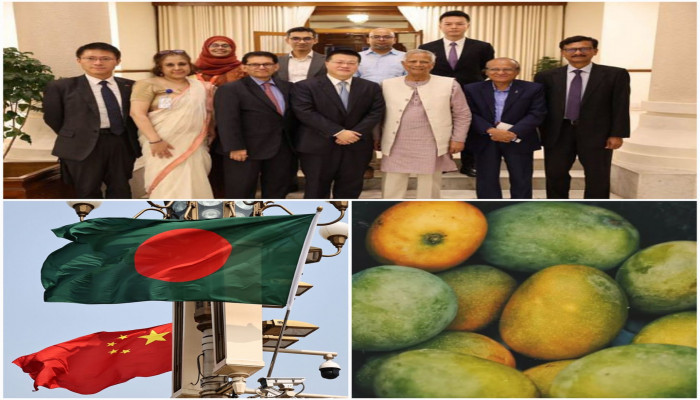Bangladesh's interim leader Yunus kick offs 'Mango Diplomacy' with China for 50-year water management plan
- In Reports
- 05:54 PM, Apr 21, 2025
- Myind Staff
On Sunday, Muhammad Yunus, the leader of Bangladesh's interim government, kicked off Dhaka's own version of 'mango diplomacy' with Beijing. He also emphasised the mutual interest of both countries in developing a 50-year master plan for water management. “Chief Adviser Professor Muhammad Yunus met with the Chinese Ambassador Mr Yao Wen at the State Guest House Jamuna on Saturday… Both sides reaffirmed their commitment to launching a long-term, 50-year master plan on water management, including work on the Teesta River system,” the statement from the Chief Adviser’s office said.
During a meeting with Yao, Yunus remarked, “I’ll send a basket of fresh mangoes to President Xi myself,” as part of Bangladesh’s effort to strengthen its relationship with China. Yunus had visited China at the end of last month before attending the Bay of Bengal Initiative for Multi-Sectoral Technical and Economic Cooperation or BIMSTEC Summit in Bangkok, where he held a bilateral meeting with Prime Minister Narendra Modi.
Amid growing tensions between New Delhi and Dhaka, Bangladesh’s interim leader selected China for his official state visit. During this trip, Yunus urged increased Chinese investments in Bangladesh to integrate the country more closely with Beijing's economy. He emphasised Bangladesh's role as the "only guardian" of the ocean in the region and pointed out that India’s Northeast is "landlocked." “Our top priority now is to move forward with the plans we discussed during the China visit…We want to make sure momentum is not lost,” said Yunus to the Chinese ambassador to Bangladesh.
Bangladesh's collaboration with China on a water management project, particularly for the Teesta River, raises concerns for India. In 2011, the two countries were close to an agreement on sharing the Teesta's water, but domestic issues in India caused the deal to collapse. Around five years ago, Sheikh Hasina, the former prime minister of Bangladesh, was also exploring a $1 billion project with China to manage the river. However, at that time, Dhaka prioritised securing a water-sharing agreement with India. India and Bangladesh saw a sharp downturn in relations last week when India withdrew a transhipment facility that allowed Bangladesh to use Indian ports and airports to export goods to other countries. India cited congestion at its facilities as the reason for this move.
A source with knowledge of the situation highlighted that Dhaka's suspension of the facility follows a series of actions that have affected trade between India and Bangladesh. These include last week's ban on importing Indian yarn, the proposed closure of three land ports, and increased physical checks on Indian imports at the Benapole Customs House. As tensions persist, Yunus has been turning to Beijing for support in developing Bangladesh's healthcare sector, which has traditionally been a key area of cooperation between India and Bangladesh.
Yunus’s office said, “The Chinese side reaffirmed their commitment to building a 1,000-bed hospital in Bangladesh, as initially proposed during the China visit. They also highlighted ongoing support in establishing a specialised burn unit in Chittagong.” Beijing also promised to “expedite” medical visas for Bangladeshis, as there is a perception that such visas have been difficult for Bangladeshi nationals to obtain when travelling to India for medical reasons.
Yunus's "mango diplomacy" initiative comes about 70 years after India sent eight mango saplings to Beijing as part of efforts to improve ties. His initiative is also reminiscent of Pakistan’s “mango diplomacy” with China in the 1960s. Although India-China relations have been complex, even after the 'mango diplomacy' of the 1950s, Islamabad's gift of golden fruit sparked a wave of excitement in Beijing in 1968.







Comments